Home » Jazz Articles » Multiple Reviews » CTI on BGO
CTI on BGO
Taylor succeeded in solving the riddle and created an iconic label whose sound and look has entered the pantheon of great labels like Blue Note, ECM and Impulse! Taylor managed to combine acoustic jazz with the new electric sound. He brought in elements of Brazilian music and classical sounds, but he kept the cool essence of jazz. To support the elegant sound of the music, Taylor enlisted photographer Pete Turner whose distinctive photographs graced many of the album covers.
By now CTI is past, but thankfully its legacy is preserved in the best possible way by the British reissue-label BGO. It is long ago BGO started reissuing CTI albums, but recently they have stepped up and the following six releases provide their most dedicated embrace of the label so far.
 Jim Hall
Jim Hall Concierto/Big Blues/Studio Trieste
BGO
2018
Bringing guitarist Jim Hall to CTI was an obvious choice for Taylor since Hall was the epitome of the artful elegance he wanted to express with his label. The match proved successful and Hall delivered a masterpiece with his first release: Concierto (1975). The key track is the interpretation of Joaquin Rodrigo's "(Theme from the Second Movement of) Concierto de Aranjuez." Here, Hall proves his ability to translate classical music into jazz as he creates an intimate orchestral sound with an all-star group that includes the liquid saxophone playing of Paul Desmond and the perfect mournful trumpet of Chet Baker. House-bassist Ron Carter leads the group through a landscape of subtle grooves and lyricism while pianist Roland Hanna has the touch of classical music and the deep spirit of jazz in his playing. Hall himself lets the melodic lines do the talking while the soft-groove master Steve Gadd swings with a modern touch. The musical conversation continues on two other excellent albums included in the BGO-package. Studio Trieste once again finds Hall in a setting with Chet Baker and flautist Hubert Laws while Big Blues is a meeting with trumpeter Art Farmer where vibraphonist Mike Mainieri adds extra atmosphere to the music.
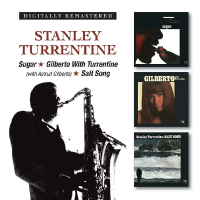 Stanley Turrentine
Stanley Turrentine Sugar/Gilberto With Turrentine/Salt Song
BGO
2018
Taylor's strategy of taking already established artists like Jim Hall and giving them a new look and sound continued when he enlisted saxophonist Stanley Turrentine. When he arrived, Turrentine had already defined his own soul jazz sound on Blue Note and the album Sugar was a refinement of his funky expression where he dug deep into his blues roots, but also showed a surprising experimental direction with his reading of John Coltrane's "Impressions." The second album in the BGO-package finds Turrentine teaming up with Brazilian singer Astrud Gilberto, but it is really the mood of the music that is the true star of the album as both Gilberto and Turrentine drift in and out. The final album, Salt Song, is also Turrentine's most ambitious. It spans his signature soul jazz on "Gibraltar," the title song, a dynamic Brazilian ballad drenched in strings, and the sophisticated gospel ballad "I Told Jesus," complete with choir and string coda. All in all, Turrentine shows himself capable of playing almost every musical style, but there's one thing his stylistic detours have in common: soul. Turrentine is a soul jazz player in every sense of the word.
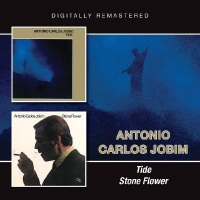 Antonio Carlos Jobim
Antonio Carlos Jobim Tide/Stone Flower
BGO
2018
CTI always had a special connection with Brazilian music. Making an album with Astrud Gilberto is one example, but the most important association is with the maestro himself: Antonio Carlos Jobim. Two of his albums, Tide and Stone Flower, are combined in a BGO-package and while Tide formally came out on A&M, it could just as well have been released on CTI. As Charles Waring points out in the liner notes: "It bears all the hallmarks of a classic C.T.I. production -just because of the fact that Creed Taylor was at the helm but also because the album replicated C.T.I.'s modus operandi. It was cut, as were most C.T.I. records, in Rudy Van Gelder's New Jersey recording facility in Englewood Cliffs (Taylor rarely recorded his acts anywhere else) and featured some of the top jazz musicians that routinely contributed to C.T.I. sessions, including bassist Ron Carter, trombonist Urbie Green, flautists Joe Farrell and Hubert Laws, percussionist Airto Moreira and pianist/arranger Eumir Deodato." Both albums unfold Jobim's compositional vision in an orchestral setting that bring them closer to classical music than regular pop and even his signature hit, "The Girl from Ipanema," gets a makeover with playful breaks and exploration of motifs with lush strings. Structures and textures are explored making both albums an aural delight.
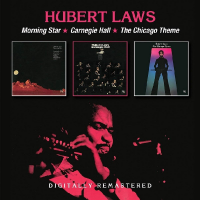 Hubert Laws
Hubert Laws Morning Star/Carnegie Hall/The Chicago Theme
BGO
2018
Flautist Hubert Laws was here, there and everywhere during his years with CTI and the reason was simple: he recorded as a leader and sideman, but he was also chosen among the session musicians that provided so-called sweetening on the records, the added layers of strings and horns. BGO has previously released a triptych of Laws' CTI recordings in a package that contained: Crying Song (1969), Afro-Classic (1970) and Rite of Spring (1971). The second package contains another three: Morning Star (1972), Carnegie Hall (1973) and The Chicago Theme (1974). Writer Charles Waring points out that In the Beginning from the same year as The Chicago Theme is one of his best albums, but it is not included. The reason must be that it is a double album and perhaps it will show up later in the reissue program. What is presented is also good and gives a full portrait of Laws moving from complex pop-jazz with shades of gospel and classical on Morning Star to a deep exploration of the meeting between classical and jazz on "Passacaglia In C Minor" from the live album Carnegie Hall. On the other hand, The Chicago Theme turns up the funk and pop with the title track that would not be out of place on a blaxploitation compilation.
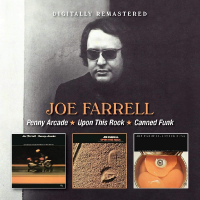 Joe Farrell
Joe Farrell Penny Arcade/Upon This Rock/Canned Funk
BGO
2018
Like Hubert Laws, saxophonist and flautist Joe Farrell also knew how to turn up the funk and does so considerably on the second collection of his albums on CTI. The first package gathered Joe Farrell Quartet (1970), Outback (1972) and Moon Germs (1972) while part two consists of Penny Arcade (1973), Upon This Rock (1974) and Canned Funk (1975). Here Farrell can be found in the company of pianist Herbie Hancock. Like Hancock, Farrell had also made the transition from acoustic to electric jazz and he was one of the original members of pianist Chick Corea's pioneering fusion group Return to Forever. On this triptych of albums, Farrell serves his own brand of fusion using contrasts, unison motifs, tempo shifts and deep grooves with unmistakable jazz flavor. Farrelll caught the modern electric sound on these albums, but his first love was acoustic modern jazz and he cut his teeth playing with tenor titan Johnny Griffin. On these three releases, guitarist Joe Beck plays a significant role with his edgy rock-drenched playing while Hancock's sophisticated approach to the keyboard can be heard on the first two albums. While it is technically advanced music, thankfully Farrell does not fall into the trap of pure pyrotechnics. Instead, the group's technical skills are used to create sophisticated music that can go everywhere at any pace like the motorcycle depicted on the cover of Penny Arcade.
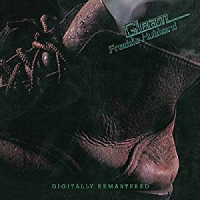 Freddie Hubbard
Freddie Hubbard Gleam
BGO
2018
Freddie Hubbard released some of his most noteworthy music while he was at CTI and it has all been reissued by BGO in two perfect packages. The double live album Gleam was not released on CTI, but it is an interesting album released on Japanese Columbia. It catches Hubbard in a period of transition where he was playing material that he had recorded for CTI and compositions that would show up on his next proper album for Columbia. It is also simply a great album with a stellar band that took the influences from rock, soul and funk and transformed them into a raw and soulful stew of extended workouts. The worn-out shoe on the cover with smoke rising from it is a suitable metaphor. This is smoking, foot-stomping, funky music with the improvisational edge of Miles Davis' Bitches Brew. There's no slick fusion in sight as percussionist Buck Clarke introduces the epic "Kuntu" with a polyphonic conga explosion that builds into a deep groove where Hubbard's trumpet pierces the sky. Throughout, drummer Carl Burnett is moving organically between tight grooves and swing and it is a joy to hear how George Cables is playing the electric piano with glistening figures. Hubbard is in top form during the concert as he both embraces high-pitched energy and tender moments. He shows himself ready for another adventure on Columbia. However, Hubbard's move to Columbia also embodies the paradox of CTI that eventually led to its downfall. Taylor wanted to create a stylish indie label that could make jazz sell again and he succeeded so much that the big labels eventually saw the potential in jazz again and started stealing his artists, just like Columbia did with Hubbard. Now CTI is history, but thankfully the many highlights on the label can be enjoyed on BGO reissues with detailed notes that put the achievement of the artists and the label into context.
Tracks and Personnel
Concierto/Big Blues/Studio Trieste
Tracks: CD1: You'd Be So Nice To Come Home To; Two's Blues; The Answer Is Yes; (Theme from the Second Movement of) Concierto de Aranjuez; Rock Skippin' (Bonus Track); Unfinished Business (Bonus Track); You'd Be So Nice To Come Home To (alternate take) (Bonus Track); The Answer Is Yes (alternate take) (Bonus Track); Rock Skippin' (alternate take) (Bonus Track). CD2: Whisper Not; A Child Is Born; Big Blues; Pavane For A Dead Princess; Malagueña; Django; Swan Lake; All Blues.
Personnel: Jim Hall: guitar; Ron Carter: bass; Chet Baker: trumpet; Roland Hanna: piano; Steve Gadd: drums; Paul Desmond: alto saxophone; Art Farmer: flugelhorn; Mike Moore: bass; Mike Mainieri: vibes; Hubert Laws: flutes; Sammy Figueroa: percussion; Jack Wilkens: guitar; Kenny Barron: piano; Gary King: electric bass; George Mraz: acoustic bass; Jorge Dalto: piano.
Sugar/Gilberto with Turrentine/Salt Song
Tracks: CD1: Sugar; Sunshine Alley; Impressions; Gibraltar (alternate version) (Bonus track); Wanting Things; Brazilian Tapestry; To A Flame; Solo El Fin (For All We Know); Zazueira; Ponteio; Traveling Light: Vera Cruz. CD2: Historia De Amor (Love Story); Where There's A Heartache (There Must Be A Heart); Just Be You (Bonus track); The Puppy Song (Bonus track); Polytechnical High (Bonus track); Gibraltar; I Told Jesus; Salt Song; I Haven't Got Anything Better To Do; Storm; Vera Cruz (alternate version) (Bonus track).
Personnel: Stanley Turrentine: saxophone; Billy Kaye: drums; Butch Cornell: organ; Lonnie Liston Smith, Jr.: electric piano; George Benson: electric guitar; Freddie Hubbard: trumpet; Ron Carter: bass; Richard "Pablo" Landrum: conga; Eumir Deodato: electric piano; Gene Bertoncini: guitar; Sam Brown: guitar; Bob Mann: guitar; Sivuca: guitar; Russell George: bass; Airto Moreira: percussion, drums; João Palma: drums, percussion; Dom Um Romão: drums, percussion; Denny Seiwell: drums, percussion; Toots Thielemans: harmonica; Hubert Laws: flute; George Marge: flute; Romeo Penque: flute; Jerome Richardson: flute; Paul Gershman: violin; Emanuel Green: violin; Julie Held: violin; Julius Brand: violin; Leo Kahn: violin; Harry Katzman: violin; Joe Malin: violin; Gene Orloff: violin; Harold Coletta: viola; George Ricci: cello; Bill Cobham: drums; Horace Parlan: piano; Richard Tee: piano; Eric Gale: guitar; Charles McCracken: cello; Alan Shulman: cello; Margaret Branch: voice; Brenda Bryant: voice; Patricia Smith: voice.
Tide/Stone Flower
Tracks: The Girl From Ipanema; Carinhoso; Tema Jazz; Sue Ann; Remember; Tide; Takatanga; Caribe; Rockanalia; Tereza My Love; Children's Games; Choro; Brazil; Stone Flower; Amparo; Andorinha; God And The Devil In The Land Of The Sun; Sabia.
Personnel: Antonio Carlos Jobim: electric piano, vocal, guitar; Eumir Deodato. Guitar; Ron Carter: bass; João Palma: drums; Airto Moreira: percussion; Everaldo Ferreira: percussion; Urbie Green: trombone; Jerry Dodgion: alto saxophone, Joe Farrell: flute, soprano saxophone; Hubert Laws: flute; Hermeto Pascoal: flute; Harry Lookofsky: violin + unnamed strings.
Morning Star/Carnegie Hall/The Chicago Theme
Tracks: CD1: Morning Star; Let Her Go; Where Is The Love; No More; Amazing Grace; What Do You Think Of This World Now?; Windows/Fire And Rain (Medley); Passacaglia In C Minor. CD2: The Chicago Theme (Love Loop); Midnight At The Oasis; You Make Me Feel Brand New; Going Home; I Had A Dream; Inflation Chaser.
Personnel: Hubert Laws: flute, alto flute, piccolo; Bob James: electric piano; Ron Carter: bass; Billy Cobham: drums; Dave Friedman: percussion, vibes; Ralph MacDonald: percussion; John Tropea: guitar; Phil Bodner: alto flute, clarinet; Romeo Penque: flute, alto flute, piccolo, English horn; Jack Knitzer: bassoon, James Buffington: French horn; Alan Rubin: trumpet, flugelhorn; Marvin Stamm: trumpet, flugelhorn; Garnett Brown: trombone; Gene Bertoncini: guitar; Dave Miller: bassoon; Freddie Watts: drums; Lani Groves: vocal; Eloise Laws: vocal; Debra Laws: vocal; Tasha Thomas: vocal; Harry Cykman: violin; Max Ellen: violin; Gayle Dixon: violin; Paul Gershman: violin; Emanuel Green: violin; Harry Lookofsky: violin; Harold Kohon: violin; Charles Libove: violin; Matthew Raimondi: violin; David Nadien: violin; Gene Orloff; violin; Elliott Rosoff: violin; Irving Spice: violin; Al Brown: viola; Manny Vardi: viola; George Ricci: cello; Alan Shulman: cello; George Koutzen: cello; Charles McCracken: cello; Lucien Schmit: cello; Gloria Agostini: harp; Dave Grolnick: keyboards; Doug Bascomb: bass; Stanley Clarke: bass; Steve Gadd: drums; Andrew Smith; Joe Beck: guitar; George Benson: guitar; Eric Gale: guitar; Phil Upchurch: guitar; Richie Resnicoff: guitar; Mike Brecker: tenor saxophone; David Sanborn: alto saxophone; Randy Brecker: trumpet.
Penny Arcade/Upon This Rock/Canned Funk
Tracks: CD1: Penny Arcade; Too High; Hurricane Jane; Cloud Cream; Geo Blue; Weathervane; I Won't Be Back; Upon This Rock; Seven Seas. CD2: Canned Funk; Animal; Suite Martinique; Spoken Silence.
Personnel: Joe Farrell: tenor, baritone & soprano saxophone, flute, piccolo; Herbie Hancock: piano; Steve Gadd: drums; Herb Bushler: bass; Joe Beck: guitar; Don Alias: conga; Jim Madison: drums; Ray Mantilla: conga, percussion.
Gleam
Tracks: CD1: Put It In The Pocket; Ebony Moonbeams; Betcha By Golly Wow; Spirits Of Trane. CD2: Kuntu; Midnight At The Oasis; Too High.
Personnel: Freddie Hubbard: trumpet, flugelhorn; Carl Randall, Jr.: saxophone, flute; George Cables: electric piano; Henry Franklin: electric bass; Carl Burnett: drums; Buck Clarke: congas, percussion.
< Previous
Flyway
Comments
Tags
Multiple Reviews
Jakob Baekgaard
Jim Hall
Chet Baker
Ron Carter
Roland Hanna
Steve Gadd
Hubert Laws
Art Farmer
Mike Mainieri
Stanley Turrentine
John Coltrane
Astrud Gilberto
Antonio Carlos Jobim
Urbie Green
Joe Farrell
Airto Moreira
Eumir Deodato
Herbie Hancock
Chick Corea
Johnny Griffin
Joe Beck
Freddie Hubbard
Miles Davis
Buck Clarke
Carl Burnett
George Cables
For the Love of Jazz
 All About Jazz has been a pillar of jazz since 1995, championing it as an art form and, more importantly, supporting the musicians who create it. Our enduring commitment has made "AAJ" one of the most culturally important websites of its kind, read by hundreds of thousands of fans, musicians and industry figures every month.
All About Jazz has been a pillar of jazz since 1995, championing it as an art form and, more importantly, supporting the musicians who create it. Our enduring commitment has made "AAJ" one of the most culturally important websites of its kind, read by hundreds of thousands of fans, musicians and industry figures every month.


















